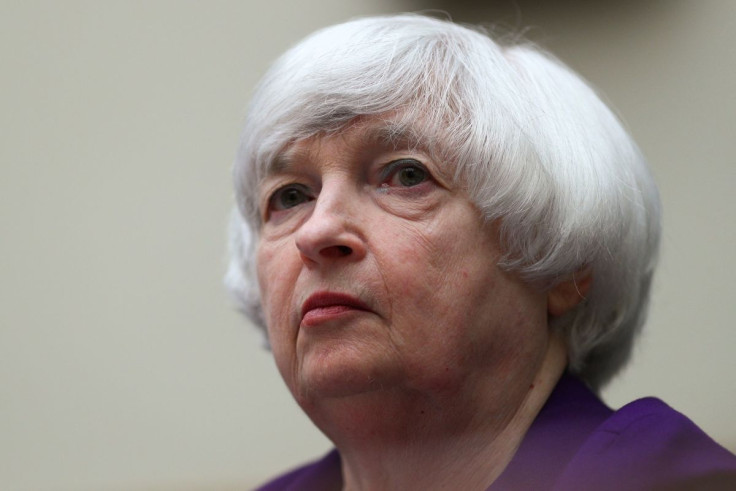Yellen Urges China To Help Stop Russia's War In Ukraine, Or Lose Standing In The World

U.S. Treasury Secretary Janet Yellen on Wednesday appealed to China and other countries to help end Russia's "heinous war" in Ukraine, warning in a landmark speech that those who seek to undermine Western sanctions face consequences.
Speaking at the Atlantic Council in Washington, Yellen said she "fervently" hoped that China would make something positive out of its "special relationship" with Russia and said Beijing's standing in the world would suffer if it fails to do so.
China cannot expect the global community to respect any future appeals from Beijing on sovereignty and territorial integrity if it fails to respect these principles in Ukraine "now when it counts," she said.
"The world's attitude towards China and its willingness to embrace further economic integration may well be affected by China's reaction to our call for resolute action on Russia," Yellen said.
Yellen said global economic growth would take a hit from the war between Russia and Ukraine and the Biden administration was resolute in its commitment to hold Russia accountable for its "horrific conduct" and its violations of international law.
"Rest assured, until Putin ends his heinous war of choice, the Biden Administration will work with our partners to push Russia further towards economic, financial, and strategic isolation," she said.
The Russian invasion had galvanized many countries and companies to take a unified stance and sever business ties with Moscow, in a way that could help shape the global response to other "unmet global challenges," Yellen said.
She warned those countries that were still "sitting on the fence, perhaps seeing an opportunity to gain by preserving their relationship with Russia and backfilling the void left by others" that their motivations were short-sighted.
"The future of our international order, both for peaceful security and economic prosperity, is at stake," she said. "And let's be clear, the unified coalition ... will not be indifferent to actions that undermine the sanctions we've put in place."
Yellen's remarks come days after President Joe Biden warned India, which has not imposed sanctions on Moscow, that buying more oil from Russia was not in India's interest and could hamper the U.S. response to the war in Ukraine.
Washington and its allies have sought to pressure India, China and other "fence-sitters" to take a clear stance opposing Russia and what it has called a "special military operation."
TACKLING OTHER BIG ISSUES
Yellen said Biden's multilateral approach had enabled the Group of Seven advanced economies to impose significant costs on Russia, and made clear they were acting in support of a rules-based global order that protects peace and prosperity.
She said the same approach - and shared values - could help solve other big issues, such as climate change, ending the COVID-19 pandemic, and supporting low-income countries.
Yellen said changes were also needed to "modernize" the Bretton Woods institutions created at the end of World War Two, including the International Monetary Fund and World Bank, to solve 21st century problems that have led to the current conflict.
Her calls come after Biden said Russia should be excluded from the Group of 20 major economies.
"Some may say that now is not the right time to think big," she said, citing the war and the lingering pandemic. "Yet, I see this as the right time to work to address the gaps in our international financial system that we are witnessing in real time."
In a question and answer session, Yellen said that the United States needed to work hard with China to avoid a bipolar global financial system that pits democracies against autocratic countries. China has benefited from the U.S.-led financial architecture but its reliance on state-owned enterprises and other economic practices puts U.S. national security interests at risk.
She also said that she was concerned about China's new strict pandemic lockdowns causing a new wave of supply chain disruptions that could hurt the world's economic recovery.
Yellen also called for a shift to 'friendshoring' of supply chains to trusted partner countries free of geopolitical conflicts.
"I would like to see us preserve the benefits of deep economic integration with China, not moving to a bipolar world, but I believe that's a danger we need to address," she said.
© Copyright Thomson Reuters {{Year}}. All rights reserved.





















